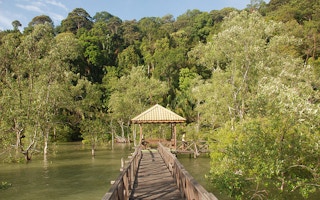Two men were charged in a Malaysian court on Friday over the killing of an indigenous land rights defender, in a case which has cast a spotlight on tribespeople’s decades-long struggle for recognition.
The duo were respectively charged with the murder and abetting in the murder of Bill Kayong in the city of Miri, in the eastern state of Sarawak last month, police said.
Kayong - a Dayak, one of the many indigenous tribes in Sarawak - was shot dead in broad daylight in his pick-up truck, prompting outcry from activists linking the murder to his fight for tribal land rights.
Police have refused to confirm whether there were any links to land disputes. “Their motive will be known once the trial commences,” Miri deputy police chief Stanley Ringgit told the Thomson Reuters Foundation.
He said police were still hunting for three other suspects.
Indigenous land rights have been a contentious issue in Sarawak, part of the vast island of Borneo which is shared between Malaysia, Indonesia and Brunei.
Activists have long blamed the rapid expansion of palm oil plantations, rampant logging and a wave of dam-building for causing environmental damage and displacing indigenous people.
“
The family is not happy because the mastermind is still at large. They want the truth, they want to know who is the person that has paid the killer.
Abun, lawyer for the family of murdered indigenous land rights activist Bill Kayong
Tribespeople have staged protests in the past, and have set up road blockades in a bid to stop some mega-projects.
Land rights activists said Kayong, who was active in politics and had stood as an opposition candidate in a recent state election, was involved in a land case involving a plantation company before his killing.
The firm has been trying to evict some 120 tribal families in remote Sarawak, in a dispute since 2014 which has been brought to court and a verdict is still pending, said Abun Sui Anyit, the legal adviser of the Sarawak Dayak Association.
“There was a confrontation between the two sides in April and Kayong had gone there to help calm the indigenous people,” he told the Thomson Reuters Foundation.
Abun, who is also a lawyer representing Kayong’s family, urged the authorities to get to the bottom of the matter, and go after the “big fish”.
“The family is not happy because the mastermind is still at large. They want the truth, they want to know who is the person that has paid the killer,” he said. Kayong leaves behind a wife and two teenage children.
London-based environmental campaign group Global Witness said Kayong’s killing “shows the risks faced by activists in Sarawak who stand up to the powerful interests behind land grabbing and environmental devastation”.
Campaigners have accused authorities of turning a blind eye to harassment against those who speak up on land rights.
The lawyer of the two accused, Ranbir Singh Sangha, said no pleas were recorded. Both face the death penalty if convicted.
This story is published with permission from Thomson Reuters Foundation, the charitable arm of Thomson Reuters, that covers humanitarian news, women’s rights, trafficking, property rights and climate change. Visit http://news.trust.org

















